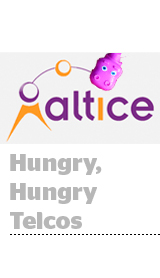 Altice continued a string of acquisitions on Thursday when the Amsterdam-based telecommunications giant announced that it would buy Cablevision for $17.7 billion.
Altice continued a string of acquisitions on Thursday when the Amsterdam-based telecommunications giant announced that it would buy Cablevision for $17.7 billion.
The Cablevision sale comes six months after Altice’s first move into the US market, when the company bought Suddenlink Communications, a regional cable operator based in St. Louis, for $9.1 billion.
Altice has a history of purchases in global markets. It finalized an $8.25 billion deal for Portugal Telecom in June, as cable operators prepare for a period of industry consolidation. At an industry trade show earlier this summer, Cablevision CEO James Dolan explicitly pushed for market consolidation, claiming it would provide “more access to resources” for regional providers.
Though Altice’s acquisitions have been regional – and small compared to the scale of Comcast’s ill-fated Time Warner takeover attempt – Cablevision’s position in the Northeast reaches a robust advertising audience.
Altice’s statement on the deal also offered a sense of the national ambition behind the market-based targets, with the headline “Altice acquires Cablevision and creates the #4 cable operator in the US market.” The implication being that Cablevision has cracked the four incumbent national leaders: Comcast, Time Warner, Charter and Cox.
Cablevision brings some of the leading advertising and marketing technology within a traditional cable company. Earlier this year, the company launched Total Audience Application (TAPP), a programmatic API used to optimize linear and addressable TV campaigns.
Ben Tatta, Cablevision’s media sales president, has advocated adapting to the rise of nonlinear TV. At the time of TAPP’s debut, Tatta described the new product to AdExchanger as “moving more toward a Google model where it’s much more real-time with the ability to optimize.”
Cablevision has also changed its reporting to account for impressions and CPMs, de-emphasizing gross ratings points as the go-to advertising metric.
TAPP represents “the first real integrated system we’re seeing from the sell side where we’re able to pull in census-level data in a turnkey way,” said Tracey Scheppach, EVP at Starcom MediaVest, one of the initial agency partners testing the product.
Altice specifically cited Cablevision’s 65% rate of “triple play” subscribers – phone, TV and Internet – in its official statement, underlining how important the convergence of digital is for cable operators.












